初中英语 人教版八年级上册第二单元知识点
人教版初中英语八年级上册Unit2知识点总结
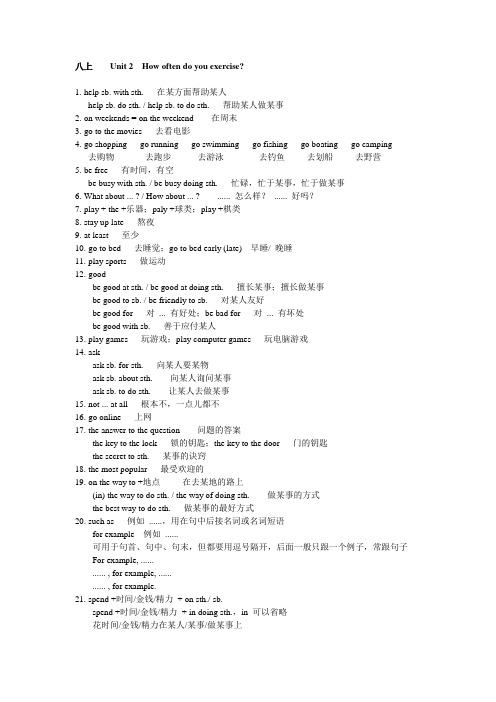
八上Unit 2 How often do you exercise?1.help sb. with sth. 在某方面帮助某人help sb. do sth. / help sb. to do sth. 帮助某人做某事2.on weekends = on the weekend 在周末3.go to the movies 去看电影4.go shopping go running go swimming go fishing go boating go camping去购物去跑步去游泳去钓鱼去划船去野营5.be free 有时间,有空be busy with sth. / be busy doing sth. 忙碌,忙于某事,忙于做某事6.What about ... ? / How about ... ? ...... 怎么样?...... 好吗?7.play + the +乐器;paly +球类;play +棋类8.stay up late 熬夜9.at least 至少10.go to bed 去睡觉;go to bed early (late) 早睡/ 晚睡11.play sports 做运动12.goodbe good at sth. / be good at doing sth. 擅长某事;擅长做某事be good to sb. / be friendly to sb. 对某人友好be good for 对... 有好处;be bad for 对... 有坏处be good with sb. 善于应付某人13.play games 玩游戏;play computer games 玩电脑游戏14.askask sb. for sth. 向某人要某物ask sb. about sth. 向某人询问某事ask sb. to do sth. 让某人去做某事15.not ... at all 根本不,一点儿都不16.go online 上网17.the answer to the question 问题的答案the key to the lock 锁的钥匙;the key to the door 门的钥匙the secret to sth. 某事的诀窍18.the most popular 最受欢迎的19.on the way to +地点在去某地的路上(in) the way to do sth. / the way of doing sth. 做某事的方式the best way to do sth. 做某事的最好方式20.such as 例如......,用在句中后接名词或名词短语for example 例如 ......可用于句首、句中、句末,但都要用逗号隔开,后面一般只跟一个例子,常跟句子For example, ............ , for example, ............ , for example.21.spend +时间/金钱/精力+ on sth./ sb.spend +时间/金钱/精力+ in doing sth.,in 可以省略花时间/金钱/精力在某人/某事/做某事上22.go to the dentist 去看牙医23.a lot of = lots of 许多,大量,后接不可数名词或可数名词的复数形式24.more than 多于;less than 少于25.most of the time 大多数时间26.how often 多久一次,询问频率how long 多长,询问物体长度或时间长短how far 多远,询问距离how many 多少个,询问数量,只能接可数名词的复数形式how much 多少个,询问数量,只能跟不可数名词多少钱,询问价格,可数名词、不可数名词都可以27.how often 提问频率*具体次数,答语可以用once, twice, three times ......once, twice 一次,两次,是固定用词三次以及三次以上,用基数词+ times,例如:three times ...... fifteen times ...... 100 times ......once a week 每周一次twice a month 每月两次four times a year 一年四次*笼统地说,用频度副词,有always usually often sometimes seldom hardly ever never 总是通常经常有时很少几乎不从不频度副词在句中的位置实义动词的前面I often go to school by bike.be动词/情态动词的后面He is always busy on weekends.We can never see him again.28.It is + adj. + (for sb.) to do sth.对于某人来说,做某事是怎样的It is hard for me to learn English.It is + n. + (for sb.) to do sth.对于某人来说,做某事是 ...It is a good habit to eat healthy food.注意:两个句式中,it都作为形式主语,不翻译否定句中,not放在be动词的后面It is not hard to learn English.It is not a good habit to eat junk food.。
人教版八年级上册第二单元英语知识点

人教版八年级上册第二单元英语知识点Unit 2 How often do you exercise?短语help sb with sth 帮助某人做某事2. hardly ever几乎从不3.go shopping去买东西4. on weekends在周末5.once a week一星期一次6. twice a month一个月两次7. go to the movies去看电影8. every day每天9.how often多久一次10.Animal World动物世界e the Internet上网12.be free=be not busy=have time 有空13.have dance and piano lessons上舞蹈和钢琴课14.swing dance摇摆舞15.play tennis打乒乓球16.stay up late熬夜到很晚17.go to bed去睡觉18.eat a healthy breakfast吃一顿健康的早餐19.at least至少,不少于,起码20.go to bed early早睡觉21.play sports做运动22.be good for对….有好处23.be good at doing sth擅长做某事24.junk food垃圾食品25.go camping去野营26.in one’s free time在某人的业余时间里27.ask sb. about sth.向某人询问某事28.not ...at all一点也不29.for fun为了娱乐30.the answers to the questions问题的答案31. by doing....通过...32.最受欢迎的the most popular33.the best way to do sth.做某事的最好方式34.such as例如….像….这样35.spend time with sb.和某人一起度过36.old habits lie hard旧习难改37.more than多于38.less than少于39.go to the dentist看牙科医生词语辨析:1.go to bed强调“上床睡觉”的动作及过程,但人不一定睡着。
人教版八年级英语上册Unit2知识点汇总总结
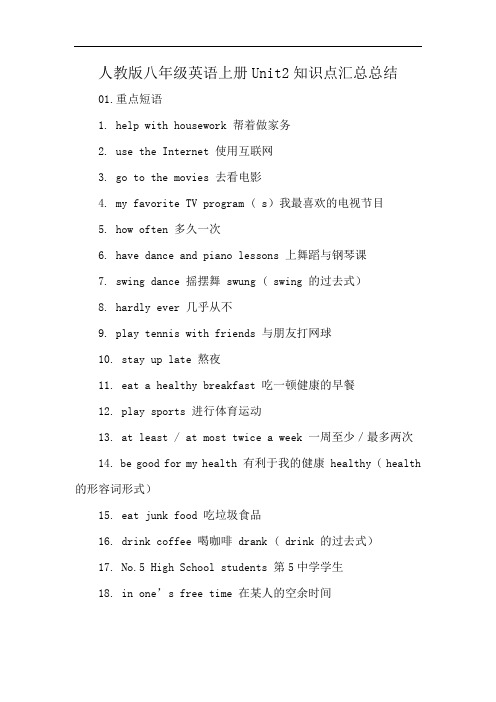
人教版八年级英语上册Unit2知识点汇总总结01.重点短语1. help with housework 帮着做家务2. use the Internet 使用互联网3. go to the movies 去看电影4. my favorite TV program ( s)我最喜欢的电视节目5. how often 多久一次6. have dance and piano lessons 上舞蹈与钢琴课7. swing dance 摇摆舞 swung ( swing 的过去式)8. hardly ever 几乎从不9. play tennis with friends 与朋友打网球10. stay up late 熬夜11. eat a healthy breakfast 吃一顿健康的早餐12. play sports 进行体育运动13. at least / at most twice a week 一周至少/最多两次14. be good for my health 有利于我的健康 healthy ( health 的形容词形式)15. eat junk food 吃垃圾食品16. drink coffee 喝咖啡 drank ( drink 的过去式)17. No.5 High School students 第5中学学生18. in one’s free time 在某人的空余时间19. ask them about their free time activities 询问他们关于他们的业余活动20. not … at all 根本不…21. go online 上网22. be surprised that ..感到惊讶23. use it for fun 为了取乐而使用它24. the answers to the questions 这些问题的答案25. one to three times a week 一周一到三次26. two percent of the students 2%的学生27. the best way to do sth.做某事的最好方式28. such as 例如29. spend time with your friends 与你的朋友共度时光spent ( spend 的过去式)30. spend time on sth./ in doing sth.花时间在某事上/做某事31. play together 一起玩32. watch TV for over 2 hours 看两个多小时电视33. go to the dentist 去看牙医34. a 16-year-old high school student 一名16岁的中学生35. have a lot of good habits 有许多好习惯36. more / less than two hours 多/少于两小时37. go to the dentist for teeth cleaning 去牙医处清洁牙齿38. go to the shopping center 去购物中心02.重点句子语法聚焦1. --What do you usually do on weekends?你在周末通常做什么?--I always exercise.我总是锻炼。
八年级上册英语人教版第二单元笔记

八年级上册英语人教版第二单元笔记一、重点单词。
1. housework.- 不可数名词,意为“家务劳动;家务事”。
例如:I often help my mother with the housework.(我经常帮助我妈妈做家务。
)2. hardly.- 副词,意为“几乎不;几乎没有”,本身具有否定意义。
例如:He can hardly speak English.(他几乎不会说英语。
)3. ever.- 副词,意为“在任何时候;从来;曾经”。
例如:Have you ever been to Beijing?(你曾经去过北京吗?)4. once.- 副词,意为“一次;曾经”。
作“一次”讲时,可用于表示频率。
例如:I go to the movies once a week.(我每周去看一次电影。
)5. twice.- 副词,意为“两次;两倍”。
例如:I have read this book twice.(我已经读过这本书两次了。
)6. Internet.- 名词,意为“(国际)互联网;因特网”。
例如:We can get a lot of information on the Internet.(我们能在互联网上得到很多信息。
)7. program.8. full.- 形容词,意为“忙的;满的;充满的”。
be full of = be filled with,意为“充满……”。
例如:The glass is full of water.(杯子里装满了水。
)9. maybe.- 副词,意为“大概;或许;可能”,通常放在句首。
例如:Maybe he is at home.(也许他在家。
)10. swing.- 名词,意为“摆动;秋千”;作动词时,意为“(使)摆动;摇摆”。
例如:There is a swing in the park.(公园里有一个秋千。
)The monkey is swinging from tree to tree.(猴子在树间荡来荡去。
Unit2知识点人教版八年级英语上册
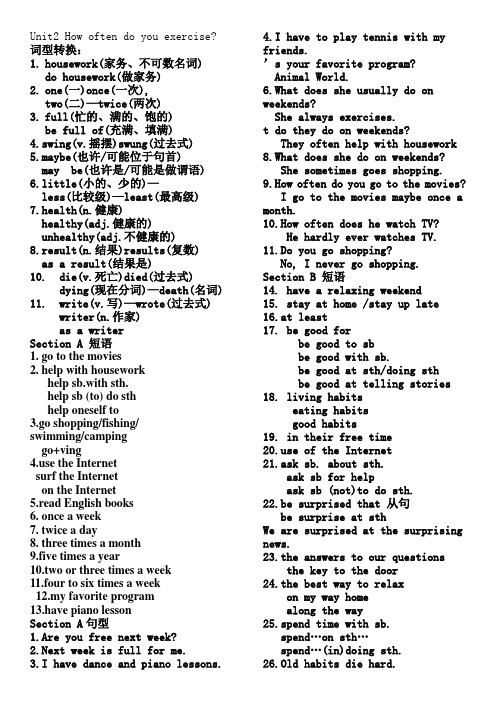
Unit2 How often do you exercise? 词型转换:1.housework(家务、不可数名词)do housework(做家务)2.one(一)once(一次),two(二)—twice(两次)3.full(忙的、满的、饱的)be full of(充满、填满)4.swing(v.摇摆)swung(过去式)5.maybe(也许/可能位于句首)may be(也许是/可能是做谓语) 6.little(小的、少的)—less(比较级)—least(最高级)7.health(n.健康)healthy(adj.健康的)unhealthy(adj.不健康的)8.result(n.结果)results(复数)as a result(结果是)10. die(v.死亡)died(过去式)dying(现在分词)—death(名词) 11. write(v.写)—wrote(过去式)writer(n.作家)as a writerSection A 短语1. go to the movies2. help with houseworkhelp sb.with sth.help sb (to) do sthhelp oneself to3.go shopping/fishing/swimming/campinggo+vinge the Internetsurf the Interneton the Internet5.read English books6. once a week7. twice a day8. three times a month9.five times a year10.two or three times a week11.four to six times a week12.my favorite program13.have piano lessonSection A句型1.Are you free next week?2.Next week is full for me.3.I have dance and piano lessons.4.I have to play tennis with my friends.’s your favorite program?Animal World.6.What does she usually do on weekends?She always exercises.t do they do on weekends?They often help with housework 8.What does she do on weekends?She sometimes goes shopping.9.How often do you go to the movies?I go to the movies maybe once a month.10.How often does he watch TV?He hardly ever watches TV. 11.Do you go shopping?No, I never go shopping.Section B 短语14. have a relaxing weekend15. stay at home /stay up late16.at least17. be good forbe good to sbbe good with sb. be good at sth/doing sthbe good at telling stories 18. living habitseating habitsgood habits19. in their free timee of the Internet21.ask sb. about sth.ask sb for helpask sb (not)to do sth.22.be surprised that 从句be surprise at sthWe are surprised at the surprising news.23.the answers to our questionsthe key to the door24.the best way to relaxon my way homealong the way25.spend time with sb.spend…on sth…spend…(in)doing sth.26.Old habits die hard.27.a 16yearold high school student an 8yearold boy28.more than =over29.go to the dentist=see a dentist30.less than 6 hours31.go online32.as a resultthe result of…… at allTwenty percent do not exercise at all.34.eat a healthy breakfast35.be full for sb.be full of= be filled with36.want sb. (not) to do sth.37.by doing sth.38.such as + n./pron./ving.39.be in good health= be/keep/stay healthySection B 句型1.We asked our students about their free time activities.2.Here are the results.3.We found out that only fifiteen percent of our students exercise every day.4.And twenty percent do not exercise at all.5. We all surprised that ninety percent of them use the Internet every day6.The answers to the questions about watching TV were also interesting.7. Although many students like to watch sports, game shows are the most popular.’s good to relax by using the Internet or watching game shows9.But we think the best way to relax is through exercise.10.You can spend time with your friends and family as you play together.作文1:How to keep healthy Health is very important. Are you healthy? Do you want to know how I keep healthy? At school, I do morning exercises and eye exercises. I try to do some running. I think It's good to relax by exercising. At home ,I clean my room and wash my clothes. I usually get up early and never stay up late. My eating habits are pretty healthy.I eat lots of fruit and vegetables.I drink milk every day. I never eat junk food or drink coffee. They are unhealthy.I'm sure if we do like that, we can keep healthy easily.作文2:Hello,I am Nancy.Let me tell you something about myself.I have a healthy lifestyle. I go to bed early and get up early every day.I never stay up late. I eat lots of vegetables and fruit and never eat junk food. I'm very healthy. I exercise at least three times a week and keep walking to school every day.At school,I study hard and listen to the teachers carefully in class. After school I always finish my homework on time. In my spare time,I often read books and sometimes I surf the Internet.I think that my healthy lifestyle helps me get good grades.。
人教版八年级英语上册第二单元必背课文、单词、重点短语与语法梳理汇总

八年级英语上册第二单元必背课文、单词、重点短语与语法梳理汇总一、必背课文2b 文章部分《What Do No. 5 High School Students Do in Their Free Time?》Last month we asked our students about their free time activities. Our questions were about exercise, use of the Internet and watching TV. Here are the results.We found that only fifteen percent of our students exercise every day. Forty -five percent exercise four to six times a week. Twenty percent exercise only one to three times a week. And twenty percent do not exercise at all!We all know that many students often go online, but we were surprised that ninety percent of them use the Internet every day. The other ten percent use it at least three or four times a week. Most students use it for fun and not for homework.The answers to our questions about watching TV were also interesting. Only two percent of the students watch TV one to three times a week. Thirteen percent watch TV four to six times a week. And eighty - five percent watch TV every day! Although many students like to watch sports, game shows are the most popular.It is good to relax by using the Internet or watching TV, but we think the best way to relax is through exercise. It is healthy for the mind and the body. Exercise such as playing sports is fun, and you can spend time with your friends and family as you play together. And remember, “old habits die hard.” So start exercising before it's too late!这篇文章是对学生课余活动调查结果的呈现,有以下重点:-频率副词的使用:如“every day”“four to six times a week”“one to three times a week”等,生动地展示了不同活动的开展频率。
人教版八年级上英语第二单元知识点总结

人教版八年级上英语第二单元知识点总结一、语法知识点总结1. 一般现在时在人教版八年级上英语第二单元中,我们学习了一般现在时的用法。
一般现在时表示习惯性、经常性或普遍性的动作或状态。
例如:She usually goes to the park on Sundays. (她通常在星期天去公园。
)2. 现在进行时现在进行时表示现阶段正在进行的动作。
例如:I am reading a book now. (我现在正在读一本书。
)3. 物主形容词物主形容词用来表达人或物所拥有的事物。
例如:My father’s car is blue. (我爸爸的车是蓝色的。
)4. 物主代词物主代词与名词具有相同的作用,用来表示所属关系。
例如:This is your book. (这是你的书。
)5. 反身代词反身代词用来强调主语,表示动作的主语也是动作的受事。
例如:Ihurt myself when I fell. (我摔倒时弄伤了自己。
)二、重点词汇总结1. join in 参加2. activity 活动3. club 俱乐部4. exercise 练习5. conversation 对话以上是对人教版八年级上英语第二单元的语法知识点和重点词汇进行了总结。
总结回顾:在本单元中,我们学习了一系列与日常生活相关的语法知识点和重点词汇。
通过掌握这些知识点和词汇,我们可以更好地表达自己,理解他人说的话,并参与到各种英语活动中去。
通过学习这些知识点和词汇,我们也可以更好地理解和使用一般现在时、现在进行时等语法知识,提高自己的英语水平。
个人观点和理解:学习语言需要不断地积累和实践,只有通过不断地实践,我们才能更好地掌握语言。
在学习英语的过程中,我们要注重词汇的积累和语法知识的理解,同时要多参与各种英语活动,提高自己的口语表达能力。
只有这样,我们才能真正地运用所学的知识,流利地表达自己的想法。
结语:通过本文的总结和回顾,相信大家对人教版八年级上英语第二单元的知识点有了更深入的理解。
最全面人教版八年级上册英语第二单元知识点归纳总结

Unit 2 How often do you exercise?一、词汇与短语●重点单词A部分1.housework n.家务劳动;家务事2.hardly adv.几乎不;几乎没有3.ever adv.在任何时候;从来;曾4.once adv. 一次;曾经5.twice adv.两次;两倍6.Internet n.(国际)互联网;因特网7.program n.节目8.full adj.忙的;满的;充满9.swing n.摆动;秋千V. (使)摆动;摇摆10.maybe adv.大概;或许;可能11.least adv.最小;最少adj. & pron.最小的;最少的B部分1.junk n.无用的东西;无价值的东西2.health n.健康;人的身体(或精神)状态3.result n.结果;后果4.percent n.百分之…5.online adj. & adp.在线(的);联网(的)6.although conj.虽然;尽管;即使7.through prep.以;凭借;穿过8.such adj. &pron.这样的;那样的;类似的9.mind n.头脑;心智10.together adv.在一起;共同11.die v.消失;灭亡;死亡12.dentist n.牙科医生13.magazine n.杂志;期刊14.however adv.然而;不过15.almost adv.几乎;差不多16.none pron.没有一个;毫无17.point n.得分;点v.指;指向● 重点短语A部分1.how often 多久一次2.help with housework 帮助做家务3.hardly ever几乎从不4.on weekends 在周末5.once a week 每周一次6.twice a month 每月两次7.be free 有空8.go to the movies 去看电影e the Internet 用互联网10.have dance and piano lessons上舞蹈课和钢琴课11.swing dance 摇摆舞12.play tennis 打网球13.stay up late 熬夜;睡得很晚14.at least 至少;不少于;起码15.play sports 进行体育活动B部分1.junk food垃圾食品2.be good for 对…有好处3.go camping 去野营4.not …at all 一点儿也不5.go online 上网6.in one's free time 在某人的业余时间7.the best way to do sth. 做某事的最好方式8.such as例如;像这样9.more than 多于10.less than 少于● 重点句子A部分1.--What do you usually do on weekends? --I often go to the movies."在周末你通常做什么?”“我经常去看电影。
八年级上册英语人教版unit2知识点
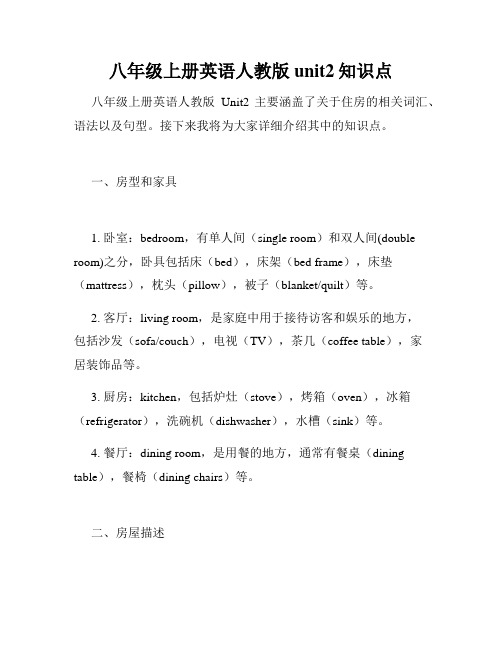
八年级上册英语人教版unit2知识点八年级上册英语人教版Unit2主要涵盖了关于住房的相关词汇、语法以及句型。
接下来我将为大家详细介绍其中的知识点。
一、房型和家具1. 卧室:bedroom,有单人间(single room)和双人间(double room)之分,卧具包括床(bed),床架(bed frame),床垫(mattress),枕头(pillow),被子(blanket/quilt)等。
2. 客厅:living room,是家庭中用于接待访客和娱乐的地方,包括沙发(sofa/couch),电视(TV),茶几(coffee table),家居装饰品等。
3. 厨房:kitchen,包括炉灶(stove),烤箱(oven),冰箱(refrigerator),洗碗机(dishwasher),水槽(sink)等。
4. 餐厅:dining room,是用餐的地方,通常有餐桌(dining table),餐椅(dining chairs)等。
二、房屋描述1. 地理位置:the location of the house。
例如:Our new house is located at the heart of the city.2. 房屋类型:the type of the house。
例如:She lives in a two-story house with a garden.3. 房屋朝向:the orientation of the house。
例如:Our house faces east, so we can enjoy the sunrise every morning.4. 房间大小:the size of the room。
例如:The living room is spacious enough to accommodate a large sofa and a coffee table.5. 装修风格:the style of the decoration。
人教版八年级上册第二单元知识点归纳
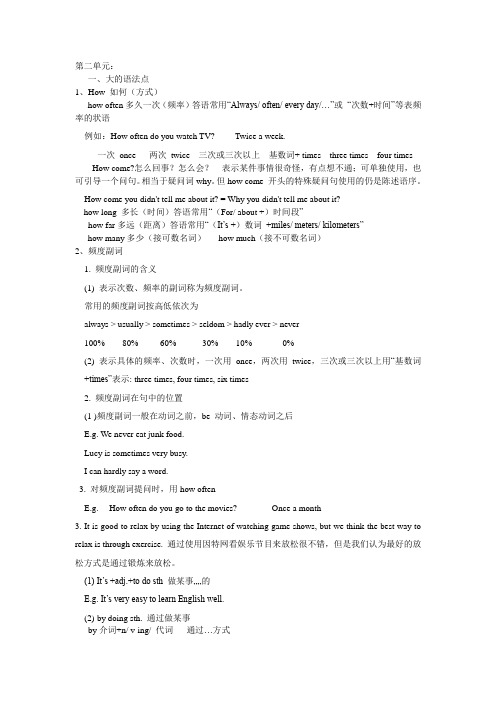
第二单元:一、大的语法点1、How 如何(方式)how often多久一次(频率)答语常用“Always/ often/ every day/…”或“次数+时间”等表频率的状语例如:How often do you watch TV? ----Twice a week.一次once 两次twice 三次或三次以上基数词+ times three times four times How come?怎么回事?怎么会?表示某件事情很奇怪,有点想不通;可单独使用,也可引导一个问句。
相当于疑问词why。
但how come 开头的特殊疑问句使用的仍是陈述语序。
How come you didn't tell me about it? = Why you didn't tell me about it?how long 多长(时间)答语常用“(For/ about +)时间段”how far多远(距离)答语常用“(It’s +)数词+miles/ meters/ kilometers”how many多少(接可数名词)how much(接不可数名词)2、频度副词1. 频度副词的含义(1) 表示次数、频率的副词称为频度副词。
常用的频度副词按高低依次为always > usually > sometimes > seldom > hadly ever > never100% 80% 60% 30% 10% 0%(2) 表示具体的频率、次数时,一次用once,两次用twice,三次或三次以上用“基数词+times”表示: three times, four times, six times2. 频度副词在句中的位置(1 )频度副词一般在动词之前,be 动词、情态动词之后E.g. We never eat junk food.Lucy is sometimes very busy.I can hardly say a word.3. 对频度副词提问时,用how oftenE.g. ---How often do you go to the movies? ---Once a month3. It is good to relax by using the Internet of watching game shows, but we think the best way torelax is through exercise. 通过使用因特网看娱乐节目来放松很不错,但是我们认为最好的放松方式是通过锻炼来放松。
人教版八年级上册英语知识点梳理Unit 2 How often do you exercise
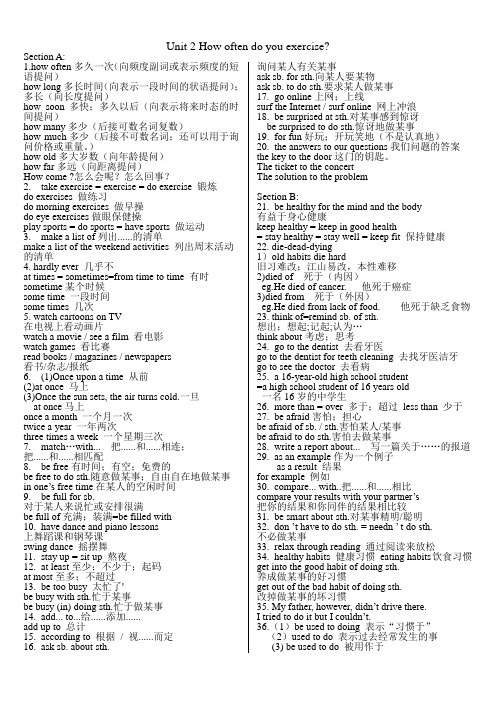
Unit 2 How often do you exercise?Section A:1.how often多久一次(向频度副词或表示频度的短语提问)how long多长时间(向表示一段时间的状语提问);多长(向长度提问)how soon多快;多久以后(向表示将来时态的时间提问)how many多少(后接可数名词复数)how much多少(后接不可数名词;还可以用于询问价格或重量。
)how old多大岁数(向年龄提问)how far多远(向距离提问)How come ?怎么会呢?怎么回事?2. take exercise = exercise = do exercise 锻炼do exercises 做练习do morning exercises 做早操do eye exercises做眼保健操play sports = do sports = have sports 做运动3. make a list of列出......的清单make a list of the weekend activities 列出周末活动的清单4. hardly ever 几乎不at times = sometimes=from time to time 有时sometime某个时候some time 一段时间some times 几次5. watch cartoons on TV在电视上看动画片watch a movie / see a film 看电影watch games 看比赛read books / magazines / newspapers看书/杂志/报纸6. (1)Once upon a time 从前(2)at once 马上(3)Once the sun sets, the air turns cold.一旦at once马上once a month 一个月一次twice a year 一年两次three times a week 一个星期三次7. match…with... 把......和......相连;把......和......相匹配8. be free有时间;有空;免费的be free to do sth.随意做某事;自由自在地做某事in one’s free time在某人的空闲时间9. be full for sb.对于某人来说忙或安排很满be full of充满;装满=be filled with10. have dance and piano lessons上舞蹈课和钢琴课swing dance 摇摆舞11. stay up = sit up 熬夜12. at least至少;不少于;起码at most至多;不超过13. be too busy 太忙了'be busy with sth.忙于某事be busy (in) doing sth.忙于做某事14. add... to...给......添加......add up to 总计15. according to 根据/ 视......而定16. ask sb. about sth. 询问某人有关某事ask sb. for sth.向某人要某物ask sb. to do sth.要求某人做某事17. go online上网;上线surf the Internet / surf online 网上冲浪18. be surprised at sth.对某事感到惊讶be surprised to do sth.惊讶地做某事19. for fun好玩;开玩笑地(不是认真地)20. the answers to our questions我们问题的答案the key to the door这门的钥匙。
Unit 2单元知识点 人教版八年级英语上册
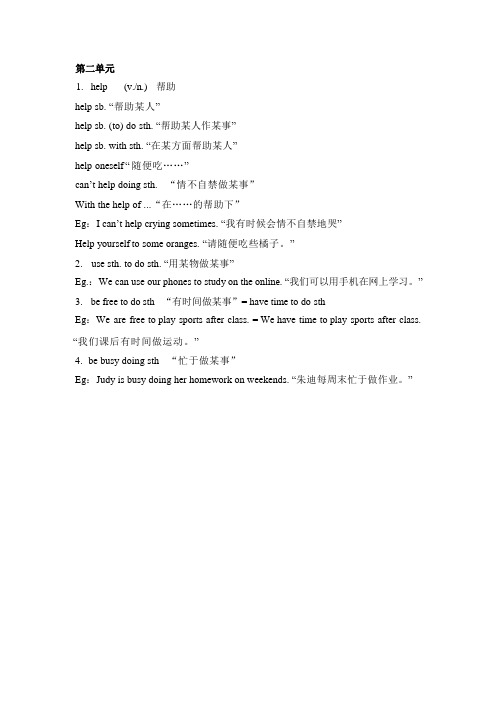
1. help (v./n.) 帮助help sb. “帮助某人”help sb. (to) do sth. “帮助某人作某事”help sb. with sth. “在某方面帮助某人”help oneself “随便吃……”can’t help doing sth. “情不自禁做某事”With the help of ...“在……的帮助下”Eg:I can’t help crying sometimes. “我有时候会情不自禁地哭”Help yourself to some oranges. “请随便吃些橘子。
”2. use sth. to do sth. “用某物做某事”Eg.:We can use our phones to study on the online. “我们可以用手机在网上学习。
”3. be free to do sth “有时间做某事”= have time to do sthEg:We are free to play sports after class. = We have time to play sports after class.“我们课后有时间做运动。
”4. be busy doing sth “忙于做某事”Eg:Judy is busy doing her homework on weekends. “朱迪每周末忙于做作业。
”5. A be full of B = A be filled with B“A 里面装满了B”Eg:The bottle is full of water.= The bottle is filled with water. “瓶子里面装满了水。
”6. What about = how about …… “……怎么样?”about 作为介词,后面人称代词要用宾格,动词要用ing 形式。
Eg :What about listening to music.= How about listening to music. “听音乐怎么样?ℽ7. Play 在表示球类、棋牌类名词前不加t he ,在乐器名词前必须加t he。
八年级上册英语unit2知识点归纳人教版
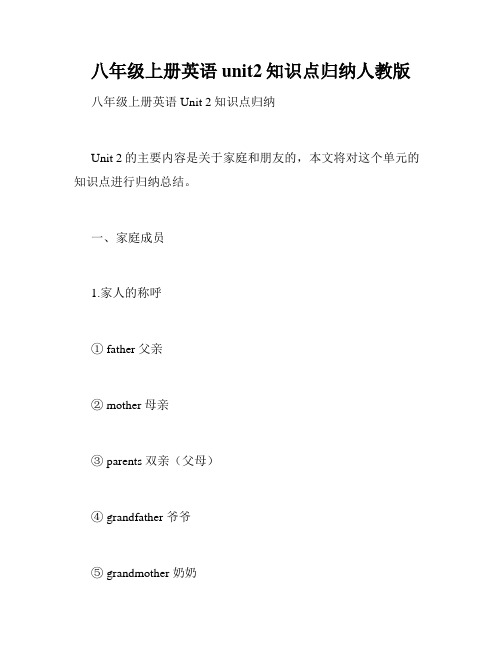
八年级上册英语unit2知识点归纳人教版八年级上册英语Unit 2知识点归纳Unit 2的主要内容是关于家庭和朋友的,本文将对这个单元的知识点进行归纳总结。
一、家庭成员1.家人的称呼① father 父亲② mother 母亲③ parents 双亲(父母)④ grandfather 爷爷⑤ grandmother 奶奶⑥ grandparents 祖父母(外公外婆或者爷爷奶奶)⑦ son 儿子⑧ daughter 女儿⑨ children 孩子⑩ elder brother 哥哥⑪ younger brother 弟弟⑫ elder sister 姐姐⑬ younger sister 妹妹2.家庭成员的职业father:teacher, doctor, businessman, worker…mother:nurse, musician, artist, housewife…grandfather / grandmother:retired, farmer, scientist, writer…brother / sister:student, athlete, musician, artist, …二、家务1.厨房用具① microwave 微波炉② refrigerator 冰箱③ stove 火炉④ oven 烤箱⑤ blender 搅拌器⑥ toaster 烤面包机⑦ kettle 水壶2.家务动词① cook 做饭② wash the dishes 洗碗③ sweep 扫地④ mop 拖地⑤ clean the bathroom 打扫浴室⑥ make the bed 整理床铺⑦ do the laundry 洗衣服三、朋友1.朋友类型① best friend 最好的朋友② close friend 亲密的朋友③ new friend 新朋友④ childhood friend 童年时的朋友⑤ schoolmate 同学2.谈论朋友的习惯和特点① He / She is always there for me. 他 / 她总是在我身边。
人教版八年级上英语第二单元重点知识点整理

八上Unit2 How often do you exercise?P91.How often 多久一次对频率提问2.频率副词(一段时间之内发生的次数):always 100% usually 80% often60% sometimes40% hardly ever 1% 否定never 0% 否定every day once a week twice a month three times a week3.一般现在时:a.定义:1. 表示现在的状态 2.表示习惯性,反复发生的动作 3. 表示客观事实或真理4.表示内心活动或喜厌等情绪。
b.结构:1. 主+ am/is/are+表语。
2. 主+v/vs+其他。
(主三单,谓s;主非三单,谓原形)c.变否变疑:有be直接用,无be找助动: V原形-do Vs- doesd.V+s怎么加:(基本和名词变复数一样)1.一般直接加s help-helps2.以s, x,ch,sh,o结尾的加es watch-watches do-does go-goes3.辅音字母+y结尾,变y为i加es study-studies4.特殊变化:have-hase.时态标志词:频率副词P10 role-play1.Are you free next week? 有空闲的2.How come? 怎么会这样?=Why?3.I have class once a week. 主非三单谓原形4.How often do you have piano lessons? Twice a week. How often 对频率提问。
5.have to 不得不,必须P13st month we asked our students about their free time activities. 询问……关于……2.Our questions were about exercise, use of the Internet and watching TV. about 关于介词,后加名词,动词要转换成动名词格式,即V+ing.3.We found that only fifteen percent of our students exercise every day. find- found 发现主谓宾语4.Forty-five percent exercise four to six time a week. 主非三单谓原形主谓5.And twenty percent do not exercise at all! 变否定借助助动词do,do后加not not…at all 一点也不6.……,but we were surprised that ninety percent of them use the Internet every day. surprised 动词过去分词,形容词性-ed 修饰人感到吃惊的7.The other ten percent use it at least three or four times a week. 至少=not less than8.The answer to our questions about watching television were also interesting. to ……的,to 所有格,一对一的所有如:the key to the door 门的钥匙9.Although 连词,引导让步状语从句,有although不用but,有but 不用although10.It’s good to relax by using the Internet or watching game shows, but we think the形式主语真正主语方式状语best way to relax is through exercise.11.It is healthy for the mind and the body. Healthy adj. 健康的health n. 健康12.You can spend time with your friends and family as you play together.spend-spent 花费四大花费:A.Sb spend/spent + 时间/金钱+on sth/(in) doing sth. 某人在某件事上或在做某件事上花费了多少时间或金钱B.It takes/ took sb 时间to do sth. 做某事花费了某人多少时间形式主语真正的主语C.Sth cost sb +金钱。
初中英语人教新目标八年级上册Unit 2 重要知识点(重点语块+词形变换+重点句子)

八年级英语上册Unit 2重要知识点Section A【重点语块】1.how often多久一次2.go to the movies看电影3.help with housework 帮忙做家务4.go shopping去购物5.hardly ever几乎从不6.once a week每周一次7.three times a week 一周三次8.twice a month一个月两次e the Internet上网10.what kind of什么种类11.swing dance摇摆舞12.stay up late熬夜13.play sports做运动14.at least至少,不少于;起码15.go to bed early早点睡觉16.eat a healthy breakfast 吃健康的早餐17.be full of...充满……18.my favorite program我最喜欢的节目【词形变换】1.hardly adv.几乎不;几乎没有→hard adv.努力地 adj.困难的;艰苦的2.exercise n.锻炼;练习→exercise v.锻炼;运动3.once adv.一次;曾经→one num.(基数词)一;一个→first num.(序数词)第一4.twice adv.两次;两倍→two num.(基数词)二;两个→second num.(序数词)第二5.least adv.& adj.最小(的);最少(的)→ little adv.& adj.小(的);少(的)→less adv.&adj.更小(的);更少(的)6.swing n.摆动;秋千v.(使)摆动;摇摆→swung(过去式)【重点句子】1.—What do you usually do on weekends?I often go to the movies.—你周末通常做什么?—我经常去看电影。
Unit2单元知识点归纳总结人教版八年级英语上册

Unit 2 知识归纳重点短语once a week / month /year 一周/月/年一次twice a week / month /year 一周/月/年两次基数词+ times a week/ month /year 一周/月/年几次stay up (late) 熬夜hardly ever 几乎从不use the Internet 使用互联网have good / bad habits 有好/ 坏习惯help sb. With sth. = help sb. (to) do sth. 帮助某人做某事ask sb. about sth. 询问某人关于某事in one’s free time 在某人的空闲时间at least 至少;不少于;起码more than 多于less than 少于go online 上网go camping 去野营such as 例如(不能加句子)go to the dentist = see a dentist 去看牙医have piano lessons 上钢琴课spend time with sb. 和某人一起度过时光swing dance 摇摆舞teeth cleaning 牙齿清洁junk food 垃圾食品the answer to the question 问题的答案the best way to do sth. 做某事的最好方式as a result 因此as a result of… 因为,由于基数词+percent of +the+名词百分之……的……so+adj. +a/an + 单数名词=such + a/an + adj.+单数名词如此/这样的一个……重点句型:见课本P11Grammar Focus语法知识频度副词一.定义:表示事情发生频率的副词称为频度副词1.频度副词按照发生的频率大小可排列为: always >usually >often >sometimes >hardly >never。
Unit 2知识归纳人教版英语八年级上册
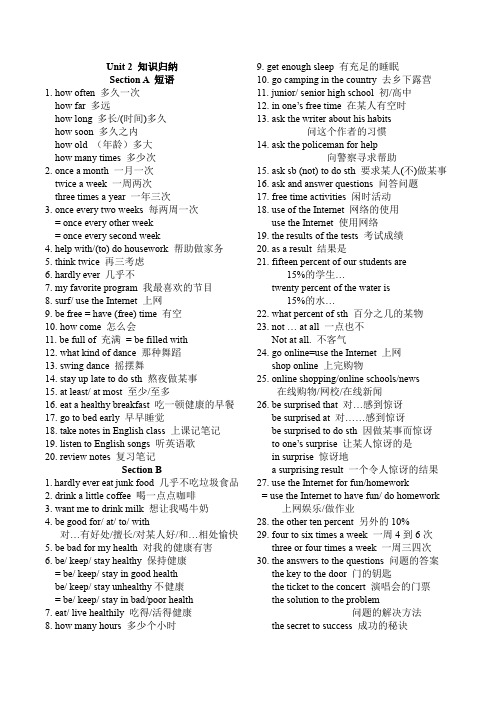
Unit 2 知识归纳Section A 短语1. how often 多久一次how far 多远how long 多长/(时间)多久how soon 多久之内how old (年龄)多大how many times 多少次2. once a month 一月一次twice a week 一周两次three times a year 一年三次3. once every two weeks 每两周一次= once every other week= once every second week4. help with/(to) do housework 帮助做家务5. think twice 再三考虑6. hardly ever 几乎不7. my favorite program 我最喜欢的节目8. surf/ use the Internet 上网9. be free = have (free) time 有空10. how come 怎么会11. be full of 充满= be filled with12. what kind of dance 那种舞蹈13. swing dance 摇摆舞14. stay up late to do sth 熬夜做某事15. at least/ at most 至少/至多16. eat a healthy breakfast 吃一顿健康的早餐17. go to bed early 早早睡觉18. take notes in English class 上课记笔记19. listen to English songs 听英语歌20. review notes 复习笔记Section B1. hardly ever eat junk food 几乎不吃垃圾食品2. drink a little coffee 喝一点点咖啡3. want me to drink milk 想让我喝牛奶4. be good for/ at/ to/ with对…有好处/擅长/对某人好/和…相处愉快5. be bad for my health 对我的健康有害6. be/ keep/ stay healthy 保持健康= be/ keep/ stay in good healthbe/ keep/ stay unhealthy不健康= be/ keep/ stay in bad/poor health7. eat/ live healthily 吃得/活得健康8. how many hours 多少个小时9. get enough sleep 有充足的睡眠10. go camping in the country 去乡下露营11. junior/ senior high school 初/高中12. in one’s free time 在某人有空时13. ask the writer about his habits问这个作者的习惯14. ask the policeman for help向警察寻求帮助15. ask sb (not) to do sth 要求某人(不)做某事16. ask and answer questions 问答问题17. free time activities 闲时活动18. use of the Internet 网络的使用use the Internet 使用网络19. the results of the tests 考试成绩20. as a result 结果是21. fifteen percent of our students are15%的学生…twenty percent of the water is15%的水…22. what percent of sth 百分之几的某物23. not … at all 一点也不Not at all. 不客气24. go online=use the Internet 上网shop online 上完购物25. online shopping/online schools/news在线购物/网校/在线新闻26. be surprised that 对…感到惊讶be surprised at 对……感到惊讶be surprised to do sth 因做某事而惊讶to one’s surprise 让某人惊讶的是in surprise 惊讶地a surprising result 一个令人惊讶的结果27. use the Internet for fun/homework= use the Internet to have fun/ do homework 上网娱乐/做作业28. the other ten percent 另外的10%29. four to six times a week 一周4到6次three or four times a week 一周三四次30. the answers to the questions 问题的答案the key to the door 门的钥匙the ticket to the concert 演唱会的门票the solution to the problem问题的解决方法the secret to success 成功的秘诀31. by watching game shows通过看竞赛类节目32. the most popular 最受欢迎的33. be popular with sb 受…的欢迎34. the best way to relax 放松的最佳方式= the best way of relaxinga good place to have fun 娱乐的好地方35. through exercise/ lots of practice/ hard work通过锻炼/很多练习/辛勤的劳动36. go through the park/door/window穿过公园/门/窗go across the road/ bridge/river过马路/桥/河37. be healthy for the mind and body对身心健康有好处38. change one’s mind 改变某人的想法39. keep … in mind 牢记于心40. make up one’s mind to do sth= decide to do sth 下定决心做某事= make a decision to do sth41. such as playing sports 比如做运动42. for example,+句子例如43. Sb spend T/M on sth/(in) doing sthIt takes sb T to do sthSth cost sb MSb pay (M) for sth44. as/when you play together在你们一起玩的时候45. forget/remember to do sth忘记/记得要做某事forget/ remember doing sth忘记/记得做过某事46. Old habits die hard. 旧习难改47. die-died-dying-dead-death 死48. die of/ from 死于49. go to the dentist= see the dentist 看牙医50. a 16-year-old high school student一位16岁大的中学生51. more than two hours = over two hours两个多小时52. all /none of us 我们所有人都/都不53. both/ neither of them 他们俩都/都不54. either of you 你们俩之一55. less than 10 points 不到10分56. point out 指出57. point to / at 指着58. be afraid of (doing) sth 害怕某物be afraid to do sth 因害怕而不敢做某事重点句型1. How often does she watch TV?(问频率)He hardly ever watches TV. 一般现在时2. How soon will he come back?(问in +时间段) He will come back in an hour. 一般将来时3. He goes to the dentist once a year.(提问) How many times does he go to the dentist every year?He goes to the dentist once a year.(提问) How often does he go to the dentist?4. He may be free next week.(同义句)Maybe he is free next week.5. I sleep eight hours every night.(提问)How many hours do you sleep every night?I sleep eight hours every night.(提问)How long do you sleep every night.6. Here be 倒装句Here is the pencil and some books.Here come s the bus.Here it is./Here they are.7. Although 与but 不能连用,但可换同义句Although he works hard, he doesn’t get good grades. 虽然他很努力,但成绩不好。
人教版八年级英语上册第二单元知识点

人教版八年级英语上册第二单元知识点【单词】housework ['haʊswɜːk] n.家务劳动hardly ['hɑːdli] adv.几乎不;简直不;刚刚ever ['evə(r)] adv.曾经;在任何时候once [wʌns] adv.一次;曾经twice [twa ɪs] adv.两倍;两次Internet ['ɪntənet] n.因特网program ['prəʊɡræm] n.节目;程序;课程;节目单full [fʊl] adj.满的;充满的;完全的swing [swɪŋ] n.摇摆;秋千v.摇摆;旋转maybe ['meɪbi] adv.或许;也许;可能swing dance 摇摆舞least [liːst] adj.最小的;最少的at least至少 hardly ever很少;几乎从不;难得junk n.垃圾;废旧杂物coffee ['kɒfi] n.咖啡;咖啡色health [helθ] n.健康;人的身体或精神状态result [rɪ'zʌlt] .结果;后果percent [pə'sent] adj.百分之...的online [ˌɒn'laɪn] adj.在线的adv.在线地television ['telɪvɪʒn] n.电视机;电视节目although [ɔːl'ðəʊ] conj.虽然;尽管;然而;可是through [θruː] prep.穿过;凭借;一直到body ['bɒdi] n.身体mind [maɪnd] .头脑;想法;意见;心思such [sʌtʃ] adj.这样的;如此的together [tə'ɡeðə(r)] adv.共同;一起die [daɪ] v.死;枯竭;消失writer ['raɪtə(r)] n.作者;作家dentist ['dent ɪst] n.牙科医生magazine ['mæɡəziːn] n.杂志however [haʊ'evə(r)] adv.然而;无论如何;不管多么than [ðən] conj.比almost ['ɔːlməʊst] adv.几乎;差不多none [nʌn] pron.没有人;没有任何东西,毫无less [les] adj.更少的;较少的point [pɔɪnt] n.看法;要点;重点;小数点;目标;分数such as例如;诸如junk food n.垃圾食品;无营养食品more than超过;多于;不仅仅;非常less than不到;少于【重点短语】1.Clean-Up Day 清洁日2. an old people’s home 养老院3. help out with sth. 帮助解决困难4. used to 过去常常......5. care for 关心;照顾6. the look of joy 快乐的表情7. at the age of 在......岁时8.clean up 打扫(或清除)干净9. cheer up (使)变得更高兴;振奋10. give out 分发;散发11. come up with 想出;提出12. make a plan 制订计划13. make some notices 做些公告牌14. try out 试用;试行15. work for 为…工作;为…. 效力16. put up 建造;举起;张贴17. hand out 分发;散发;发给18. call up 打电话;召集19. put off 推迟;延迟20. for example 比如;例如21. raise money 筹钱;募捐22. take after 与......相像;像23. give away 赠送;捐赠24. fix up 修理;修补;解决25. be similar to 与……相似26. set up 建立;设立27. disabled people 残疾人28. make a difference 影响;有作用29. be able to 能够30. after-school reading program 课外阅读项目【重点句型】1. The boy could give out food at the food bank.这个男孩可以在食品救济站分发食物。
人教版八年级上册英语Unit 2 知识点语法归纳总结
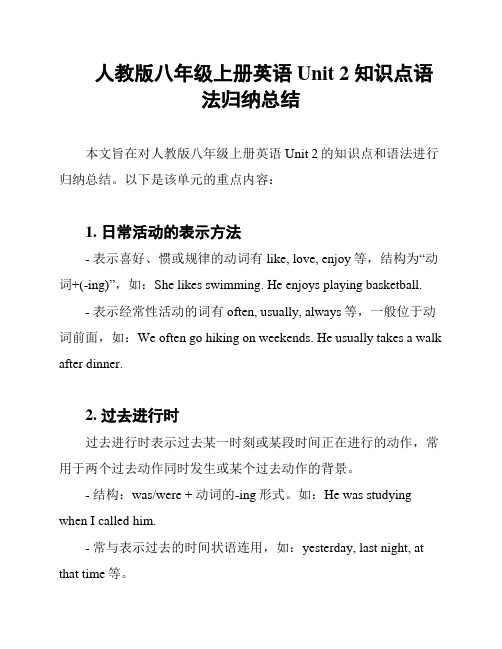
人教版八年级上册英语Unit 2 知识点语法归纳总结本文旨在对人教版八年级上册英语Unit 2的知识点和语法进行归纳总结。
以下是该单元的重点内容:1. 日常活动的表示方法- 表示喜好、惯或规律的动词有like, love, enjoy等,结构为“动词+(-ing)”,如:She likes swimming. He enjoys playing basketball.- 表示经常性活动的词有often, usually, always等,一般位于动词前面,如:We often go hiking on weekends. He usually takes a walk after dinner.2. 过去进行时过去进行时表示过去某一时刻或某段时间正在进行的动作,常用于两个过去动作同时发生或某个过去动作的背景。
- 结构:was/were + 动词的-ing形式。
如:He was studying when I called him.- 常与表示过去的时间状语连用,如:yesterday, last night, at that time等。
3. 被动语态的构成和用法- 构成:be + 过去分词。
如:The book was written by a famous author.- 主动句变被动句的转换方法:将主动句的宾语变为被动句的主语,原主语变为介词"by"的宾语。
如:She eats an apple.(主动句)→ An apple is eaten by her.(被动句)- 被动语态用于强调动作的承受者,或者当我们不知道或不关心动作的执行者是谁时。
4. 双宾语结构有些动词后面既可以跟一个间接宾语,也可以跟一个直接宾语,这种结构称为双宾语结构。
- 结构:动词 + 间接宾语 + 直接宾语。
如:She bought her sister a present.- 常见的双宾语动词有give, send, lend, teach等。
初二上册英语第二单元知识点人教版【三篇】
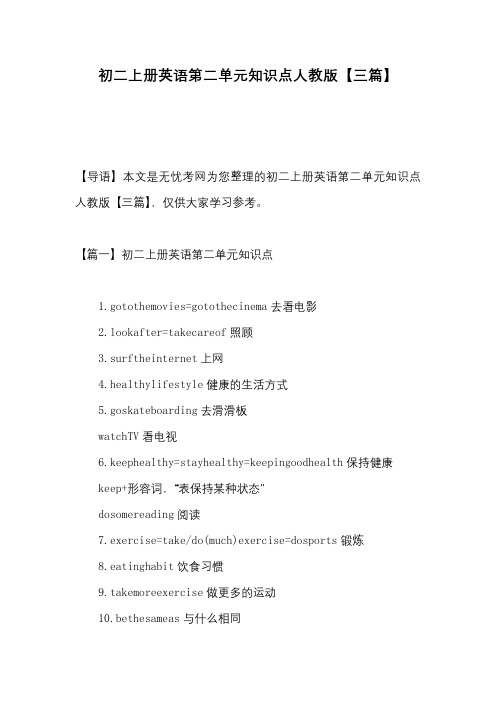
初二上册英语第二单元知识点人教版【三篇】【导语】本文是无忧考网为您整理的初二上册英语第二单元知识点人教版【三篇】,仅供大家学习参考。
【篇一】初二上册英语第二单元知识点1.gotothemovies=gotothecinema去看电影2.lookafter=takecareof照顾3.surftheinternet上网4.healthylifestyle健康的生活方式5.goskateboarding去滑滑板watchTV看电视6.keephealthy=stayhealthy=keepingoodhealth保持健康keep+形容词,“表保持某种状态”dosomereading阅读7.exercise=take/do(much)exercise=dosports锻炼8.eatinghabit饮食习惯9.takemoreexercise做更多的运动10.bethesameas与什么相同11.onceamonth一月一次12.bedifferentfrom不同13.twiceaweek一周两次.threetimesaweek一周三次14.makeadifferenceto对什么有影响如:Asteachers,youmustbelievethatyoucanmakeadifferencetothelive sofyourstudents.身为教师,你们必须坚信你们能够影响学生的一生。
如:Afalsestepwillmakeagreatdifferencetomyfuture.错走一步对我的前程来说会产生很大影响。
15.howoften多久一次,询问动作发生的频率howmanytimes多少次,用来提问做某事的次数16.although=though虽然17.mostofthestudents=moststudents大多数学生18.shop=goshopping=dosomeshopping购物19.asfor至于20.activitysurvey活动调查21.dohomework做家庭作业22.dohousework做家务事23.eatlessmeat吃更少的肉24.junkfood垃圾食物25.begoodfor对什么有益26.bebadfor对什么有害27.wanttodosth想做某事28.wantsbtodosth想某人做某事29.trytodosth尽量做某事ehomefromschool放学回家31.ofcourse=certainly=sure当然32.getgoodgrades取得好成绩33.someadvice一些建议someadvice中的advice是不可数名词apieceofadvice一则建议giveadvice提出建议takeone’sadvice采纳或听从某人的建议34.helpsbtodosth帮助某人做某事=helpsbwithsth35.alotofvegetables=manyvegetables许多蔬菜36.hardly=almostnot几乎不hardlyever很少,几乎不,从不37.keep/beingoodhealth保持健康38.yourfavoriteprogram你最喜欢的节目39.AnimalWorld动物世界40.playsoccer踢足球41.everyday每天42.onceortwiceaweek每周一两次43.threeorfourtimesaweek每周三四次44.atGreenHighSchool在格林高中45.allstudents所有的学生46.moststudents大多数学生47.somestudents一些学生48.nostudents没有学生49.theresultofasurvey调查结果50.theresultfor“watchTV”“看电视”的调查结果51.improveyourEnglish提高你的英语52.drinkmilk喝牛奶53.prettyhealthy相当健康pretty,adv.相当,非常Pretty(用作副词时)=rather=very=quite非常,相当54.kindof=alittle有点IthinkI’mkindofunhealthy.我想我有点不健康。
- 1、下载文档前请自行甄别文档内容的完整性,平台不提供额外的编辑、内容补充、找答案等附加服务。
- 2、"仅部分预览"的文档,不可在线预览部分如存在完整性等问题,可反馈申请退款(可完整预览的文档不适用该条件!)。
- 3、如文档侵犯您的权益,请联系客服反馈,我们会尽快为您处理(人工客服工作时间:9:00-18:30)。
Unit 2 How often do you exercise?Section A1.How often do you exercise?how often 对做某事的次数/频率进行提问,常用表示频率的词进行回答,如:always, usually, often, sometimes等。
2.表示频率的短语次数+一段时间“多久一次”次数为三次及以上:“基数词+times”如:once a day, twice a week, three times a month...3.Hi,Clair, are you free next week?sb be free= sb have time 某人有空Are you free?=Do you have time?sth be free 某物是免费的The best things in life are free.生活中最好的东西是免费的。
4.Hmm...next week is quite full for me.be quite full for sb=be quite busy for sb 某人很忙5.She said it’s good for my health.health (n.) 健康---healthy(adj.) 健康的unhealthy 不健康的Be in good health=healthy 身体健康Grammar focus6.How often的用法how often 用来对表示做某事的频率进行提问,回答时可以用表示频率副词或表示频率的短语进行回答。
如:---How often do you go shopping?(1)---I often go shopping. (频率副词回答)(2)---I go shopping twice a week. (频率短语回答)2.频率副词位置:be之后,动之前。
(be动词之后,Shiite动词之前)频率词及发生概率大小(由大到小):Always, usually, often, sometimes, hardly ever, never(100%--0%) 3.频率短语位置:句尾次数+一段时间如:---How often do you watch TV?---I watch TV twice a week.4.与how相关的短语(1)怎么,怎样。
对方式,方法进行提问。
如:---How do you go to school?---I go to school by bike.(2)how far 多远,对距离提问如:---How far is it from your home to school?---It’s 2 kilometers./It’s about 20 minutes’ by bus.(3)how long 多久时间/长度多长,对时间/长度进行提问如:---How long does it take you from home to school?---About 30 minutes by bike.---How long is this river?---About 3000 kilometers.(4)how soon 多久以后,回答用“in +一段时间”,表示将来时态如:---How soon will you be back?---In two weeks.(5)how often 多久一次,对频率进行提问,回答用频率副词或频率短语(6)how many times 多少次,对次数进行提问。
问句中有表示时间段的词。
如:---How often do you go shopping?---I often go shopping./I go shopping twice a week.---How many times do you go shopping in a week?---Twice./I go shopping twice a week.Section B1....but my mom wants me to drink it, she says it’s good for my health.(1)want sb to do sth 想要某人做某事(2)be good for sb/sth 对某人/某事有好处(3)be bad for sb/sth 对某人/某物不利(4)keep/stay/be in good health= keep/stay/be/ health y保持健康2.Let’s start with the first question.start with sth...从...开始3.I can’t stand milk.stand v. 忍受stand 站立4.I eat three or four times a week.three or four times a week 一周三,四次three to five times a week 一周三到五次e the Internet=go online 上网6.go campinggo + v-ing 表示“去做某事”go hiking/shopping/boating...7.in the country=in the countryside 在乡下/乡村8.What do No.5 High School students do in their free time?in one’s free time 在某人空闲的时候st month we asked our students about their free time activities.(1)ask sb about sth 询问某人关于某事He asks me something about learn ing English.(2)ask (sb) for sth 请求(某人)给予某物(3)ask sb (not) to do sth 让某人(不)做某事(4)ask sb sth 询问某人某事10.Here are the results.在以地点副词开头的句子中,如果主语是名词(短语),句子要用倒装句。
结构为:Here/There + 谓语+主语。
11....We found out that only fifteen percent of our students exercise every.(1)表示“百分之几的.../...percent of sth”做主语时,谓语动词的单复数取决于of后面的名词,如果of后面的名词是可数名词时,谓语动词用复数,of后面的名词是不可数名词时,谓语动词用单数。
如:15% of students are boys.20% of the milk is water.(2)find out 发现,发觉12.Twenty percent do not exercise at all.not..at all 根本,一点也不not 放在be动词或者助动词后面,at all 放句尾。
如:He is not fat at all.She doesn’t like dancing at all.not at all 在口语中单独成句,用来回答感谢或者道歉语。
---Thank you for your help!---Not at all. (不客气)---Sorry for keeping you waiting.---Not at all.(没关系)13.Most students use it for fun and not for homework.for+ n./v-ing 表目的“为了”I made this tool for helping you.14.The other ten percent use it at least twice or four times a week.the other adj. 其余的,另外的区分:other, the other, others, another, the othersEg: I have some other books.I have two pets. One is white, the other is black.Some students like football, and others like basketball.There are 10 balls. 6 are red, and the others are yellow.The apples are pretty, I want another 2 apples.15.The answers to our question about...the answer to the question ...问题的答案the key to the door 门的钥匙16.Although many students like to watch sports, game shows are the most popular.(1) although: 有虽然没但是,有因为没所以(2)popular: 受欢迎的;流行的be popular with/among sb 受...欢迎get popular 受欢迎;流行17.It is good to relax by using the Internet or ...(1)It’s + adj. (for sb)to do sth 对某人来说做某事是...的(2)介词by的用法①表示方位,意为“在...旁边”②表示时间,意为“在...之前”③表示交通方式意为“搭乘...”④表示作者,意为“由...创作(编导/作曲/导演)”He is sitting by the tree. 他坐在树旁边。
Can you finish the work by 12 o’clock? 你能在5点前完成工作吗?She goes to school by subway. 她坐地铁去学校。
This is a famous book by Li Xun. 这是鲁迅的一本有名的书。
18....we think the best way to relax is through exercise.(1)the best way to do sth 做某事的最佳方法是...to do 放在名词后面修饰前面的名词如:This is a good place to relax.这是一个休息的好地方。
